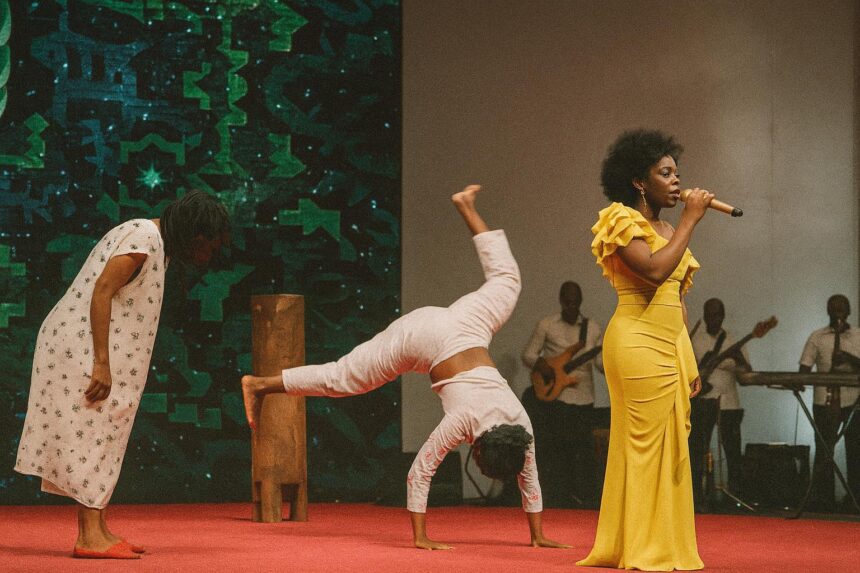Soft Power Resonates across the Congo River
When the first percussion roll pierced the July dusk in Brazzaville, the 80-metre stage became more than an artistic arena: it evolved into an instrument of statecraft. Over 250 dancers, two acclaimed slammers—Mariusca Moukengue and Black Panthère—and the choreographer-musician Gervais Tomadiatunga converged to open the 12th Pan-African Music Festival. Their collective tableau, aptly titled “The Year of Youth”, mirrored the festival’s theme, “Music and Economic Stakes in Africa in the Digital Era”, by interweaving traditional rhythms with sampled electronic textures. Observers noted how the performance echoed Joseph Nye’s concept of soft power, translating intangible cultural capital into influence that reverberates well beyond the banks of the Congo River (Brookings, 2022).
Presidential Patronage and Strategic Signalling
Seated prominently in the Palais des Congrès, President Denis Sassou Nguesso—accompanied by First Lady Antoinette Sassou Nguesso and Prime Minister Anatole Collinet Makosso—watched the spectacle unfold. Their presence, alongside ministers and foreign envoys, underscored Brazzaville’s determination to marry governance and culture in a single diplomatic gesture. Diplomatic observers saw in the presidential applause a deliberate signal: the Republic of Congo intends to position cultural production as a central pillar of its post-COVID economic resetting. By championing local artists on a continent-wide platform placed under the aegis of the African Union, the Head of State conveyed both continuity and renewal, affirming a policy line that privileges regional integration through cultural dialogue (African Union Commission, 2023).
The Economics of Rhythm in the Digital Age
Behind the flamboyant choreography lies an economic proposition. Sub-Saharan Africa’s music streaming revenues are projected to grow by double digits annually through 2026 (IFPI, 2023). Congo-Brazzaville seeks a share of that digital dividend. Authorities leveraged Fespam as a showroom for local start-ups specialising in content aggregation, while panels on intellectual-property law and blockchain-based royalty tracking unfolded behind the scenes. The festival’s executive secretariat hinted at talks with pan-African platforms Audiomack and Boomplay to spotlight Congolese catalogues. Such initiatives align with the government’s 2022–2026 National Development Plan, which earmarks creative industries as a priority sector. Economists at the University Marien-Ngouabi estimate that formalising the domestic music market could eventually raise non-oil GDP by one percentage point.
Youth, Innovation and National Narrative
On stage, Moukengue’s spoken-word cadence melded with Tomadiatunga’s fusion of hip-hop footwork and folkloric gestures. In a post-performance interview, the slammer stated that “there exists an artistic unity where rhythm, word and body speak of hope.” Her emphasis on hope dovetails with governmental pledges to expand vocational training in the cultural sector. By foregrounding performers under thirty, organisers cultivated a narrative of empowered youth capable of self-employment—a message consistent with the African Union’s continental initiative on youth entrepreneurship. The performers’ plea for trust therefore acted as both cultural expression and policy advocacy, reinforcing the administration’s call for private investment in creative start-ups.
Cross-Continental Reverberations
Fespam’s diplomatic reach extends well beyond Central Africa. Delegations from Cameroon, Ghana and Cuba convened in Brazzaville’s sideline workshops devoted to rumba—a genre inscribed on UNESCO’s Representative List of Intangible Cultural Heritage in 2021 (UNESCO, 2021). For visiting cultural ministers, the festival offered an arena to discuss copyright harmonisation and visa facilitation for artists. Analysts noted that such encounters complement the African Continental Free Trade Area by lowering non-tariff barriers in the cultural sphere. In the words of a Senegalese delegate, the festival has become “a rehearsal space for African unity in 4/4 time.”
Future Cadences of Cultural Diplomacy
As the final drumbeat faded, the political symbolism endured. By hosting Fespam every two years since 1995—even amid fluctuating oil prices and pandemic constraints—Congo-Brazzaville showcases remarkable institutional resilience. The 2023 edition affirmed a strategic triad: preserve heritage, monetise creativity and project stability. International partners took note; France’s Centre National de la Musique confirmed exploratory discussions on co-production grants, while China’s embassy proposed technical exchanges on stagecraft lighting. For Brazzaville, such overtures validate culture as leverage in a multipolar order. Should the announced digital-royalty pilot succeed, the next Fespam may well resonate as both concert and case study in developmental diplomacy.


















